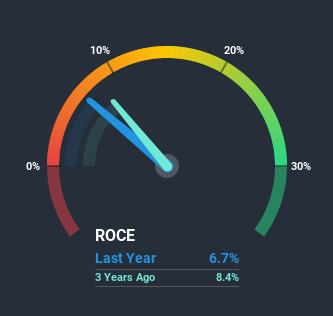- India
- /
- Electrical
- /
- NSEI:UNIVCABLES
Universal Cables (NSE:UNIVCABLES) Will Will Want To Turn Around Its Return Trends

Did you know there are some financial metrics that can provide clues of a potential multi-bagger? Typically, we'll want to notice a trend of growing return on capital employed (ROCE) and alongside that, an expanding base of capital employed. This shows us that it's a compounding machine, able to continually reinvest its earnings back into the business and generate higher returns. In light of that, when we looked at Universal Cables (NSE:UNIVCABLES) and its ROCE trend, we weren't exactly thrilled.
Understanding Return On Capital Employed (ROCE)
If you haven't worked with ROCE before, it measures the 'return' (pre-tax profit) a company generates from capital employed in its business. The formula for this calculation on Universal Cables is:
Return on Capital Employed = Earnings Before Interest and Tax (EBIT) ÷ (Total Assets - Current Liabilities)
0.067 = ₹916m ÷ (₹21b - ₹7.3b) (Based on the trailing twelve months to September 2020).
Thus, Universal Cables has an ROCE of 6.7%. In absolute terms, that's a low return and it also under-performs the Electrical industry average of 11%.
View our latest analysis for Universal Cables

Historical performance is a great place to start when researching a stock so above you can see the gauge for Universal Cables' ROCE against it's prior returns. If you want to delve into the historical earnings, revenue and cash flow of Universal Cables, check out these free graphs here.
So How Is Universal Cables' ROCE Trending?
In terms of Universal Cables' historical ROCE movements, the trend isn't fantastic. To be more specific, ROCE has fallen from 11% over the last five years. And considering revenue has dropped while employing more capital, we'd be cautious. If this were to continue, you might be looking at a company that is trying to reinvest for growth but is actually losing market share since sales haven't increased.
On a side note, Universal Cables has done well to pay down its current liabilities to 35% of total assets. That could partly explain why the ROCE has dropped. What's more, this can reduce some aspects of risk to the business because now the company's suppliers or short-term creditors are funding less of its operations. Since the business is basically funding more of its operations with it's own money, you could argue this has made the business less efficient at generating ROCE.
The Bottom Line On Universal Cables' ROCE
In summary, we're somewhat concerned by Universal Cables' diminishing returns on increasing amounts of capital. However the stock has delivered a 84% return to shareholders over the last five years, so investors might be expecting the trends to turn around. Regardless, we don't feel too comfortable with the fundamentals so we'd be steering clear of this stock for now.
One final note, you should learn about the 4 warning signs we've spotted with Universal Cables (including 1 which can't be ignored) .
While Universal Cables isn't earning the highest return, check out this free list of companies that are earning high returns on equity with solid balance sheets.
If you’re looking to trade Universal Cables, open an account with the lowest-cost* platform trusted by professionals, Interactive Brokers. Their clients from over 200 countries and territories trade stocks, options, futures, forex, bonds and funds worldwide from a single integrated account. Promoted
If you're looking to trade Universal Cables, open an account with the lowest-cost platform trusted by professionals, Interactive Brokers.
With clients in over 200 countries and territories, and access to 160 markets, IBKR lets you trade stocks, options, futures, forex, bonds and funds from a single integrated account.
Enjoy no hidden fees, no account minimums, and FX conversion rates as low as 0.03%, far better than what most brokers offer.
Sponsored ContentNew: AI Stock Screener & Alerts
Our new AI Stock Screener scans the market every day to uncover opportunities.
• Dividend Powerhouses (3%+ Yield)
• Undervalued Small Caps with Insider Buying
• High growth Tech and AI Companies
Or build your own from over 50 metrics.
This article by Simply Wall St is general in nature. It does not constitute a recommendation to buy or sell any stock, and does not take account of your objectives, or your financial situation. We aim to bring you long-term focused analysis driven by fundamental data. Note that our analysis may not factor in the latest price-sensitive company announcements or qualitative material. Simply Wall St has no position in any stocks mentioned.
*Interactive Brokers Rated Lowest Cost Broker by StockBrokers.com Annual Online Review 2020
Have feedback on this article? Concerned about the content? Get in touch with us directly. Alternatively, email editorial-team (at) simplywallst.com.
About NSEI:UNIVCABLES
Universal Cables
Manufactures and sells electrical and other cables, capacitors, wires and conductors, and other products under the UNISTAR brand name in India and internationally.
Mediocre balance sheet second-rate dividend payer.
Market Insights
Community Narratives



